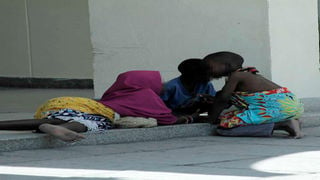
Street Children along Nkrumah Road in Mombasa on December 5, 2021.
| Kevin Odit | Nation Media GroupMombasa
Premium
The men who get rich from child beggars
*Mary (not her real name) has been begging in Mombasa since February this year so that her father, who has cancer, gets money for medication.
The nine-year-old said she was lured to Mombasa by her uncle, who is her guardian, with the promise of getting a job, only to be taken to the streets to beg.
Her uncle had promised to ensure she goes to school once they collect enough money for her education.
Mary, who had dropped out of Grade Four, was full of hope for a better life when she left her home in Bungoma.
“The money I collect pays for my father’s health, our food and some for my education. When my uncle came to fetch me, he promised my parents he would take care of me,” narrated the girl in an interview with the Nation.
But on arriving in Mombasa, her uncle housed her in a one-room shanty in Kisumu Ndogo slum, where he lived.
“He told me my job would be begging in the streets. My uncle buys me food and I work every day. Sometimes I make Sh6,000, but on a bad day, we go home with Sh2,000. My uncle does not work. He just supervises the begging I do,” she revealed.
Mary said she couldn’t refuse the offer due to poverty.
But last week, the girl was arrested by the Mombasa County Inspectorate team during a mop up of street children in the city.
Faking disability
Some minors who were faking disability while being pushed on wheelchairs ran when they saw the other beggars being arrested.
Investigations by the Nation have unveiled a begging syndicate in the tourist city profiting from the unsuspecting public.

A beggar crawls in-between traffic along Uhuru Highway, Nairobi on March 23, 2021.
Mombasa and Nairobi are at the centre of the criminal network, which uses children and disabled foreigners as beggars, with promises of their families in rural areas being taken care of, or funding for their education in the future.
The illegal industry rakes in millions of shillings every year.
The criminal network forces children and those with disabilites to stand or sit in strategic corners that have high human traffic to attract the passers-by.
The individuals who run the rackets then pocket most of the proceeds from begging.
“The individuals get around Sh6,000 a day. We have been receiving complaints from the public about the fake beggars and guardians abusing minors,” said Mr Ibrahim Basafar, the deputy director in charge of operations at the Inspectorate.
“They ‘rent’ children and have to return the minor with Sh1,000 daily. This is a coordinated business between guardians and unscrupulous individuals. We have a 33-year-old who was pretending his leg was amputated, but during arrest, he walked,” said Mr Basafar.

A beggar outside Holy Ghost Cathedral in Mombasa on December 5, 2021.
The county inspectorate team said some of the beggars display fake injuries and impairments to elicit sympathy, and money from the public.
Some wear dirty socks and use tomato sauce to stain them to show they are either bleeding or hurting.
A majority of the beggars are not Kenyans, but Tanzanians who have visitor’s visas and are mostly housed in Nyali and Kongowea, said Mr Basafar.
Big business
“It’s a big business. They are housed, ferried to the city centre and have a boss who collects the day’s collections. I am urging the police and Immigration to cooperate with us to deal with this issue. Kenyans are being fleeced of their money by pretenders,” he added.
He said the begging had become a ‘profession’ for many.
“We have one beggar who has a flat in Changamwe. The children are coached so they do not reveal the truth when arrested," he added.
The Inspectorate said it would continue with the round-up until it gets rid of the beggars from the streets.
The trend of syndicates using foreign beggars has been around for a while, with the Coast, Nairobi, Mt Kenya, Central Rift and Western counties the most affected.
Five years ago, a lecturer was arrested for moving beggars from Tanzania to Mombasa.
Ms Halima Sertoi, a former public prosecutor who also works at the county Inspectorate said seven Tanzanians were arrested and taken to the Central Police Station.
In September, Interior and Citizen Services Principal Secretary Karanja Kibicho, announced a crackdown on illegal immigrants.
The PS said the continuous crackdown would be undertaken by the Immigration department and the police.
Additional reporting Brian Wachira





